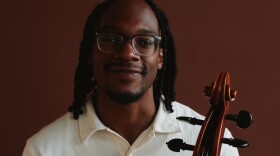Even though Thanksgiving will be different for many us because of the pandemic, we can still appreciate the history behind the meal — so long as it’s accurate. Culinary historian Kyle Cherek talks about some of the historical misconceptions we have about Thanksgiving, and why it’s important to set the record straight.
“[Thanksgiving] has become part of our national mythology but the early beginnings of it are not what children sing,” he says.
The first misconception is that the Pilgrims were discovering a vast, primitive world when they landed at Plymouth Rock but in reality, Indigenous people already had a full grasp of this land.
“When they landed there, they saw roads. They saw multi-generational, 100-year-old roads that the Natives had basically created by this well-beaten path of going to the shoreline in the summer for all of the abundant seafood,” Cherek explains. “And the great irony of Plymouth Rock is that French explorers, essentially a party not unlike the Pilgrims, had been there almost a year before and realized this is not a good place to settle.”
Some Europeans at the time complained about how densely populated areas, noting the copious numbers of bonfires, smelled like smoke for miles.
The food at the first Thanksgiving also differs from current traditions, according to Cherek. The main courses included venison and seafood with some turkey present and the meal lasted three days.
Current Thanksgiving tradition started in 1863 when President Abraham Lincoln decided it would help bring the country together, he says. For almost half a century after that, southern states pushed against Thanksgiving and would do things like move the date each year to make it harder for southerners to celebrate. But in the 1920s, Cherek says traditions started to come together.
“It wasn’t until the ‘20s that we coalesced as a country around Thanksgiving and the pumpkin pie, which is very much a northern dessert, kind of migrated into a sweet potato pie in the south,” he says.
In 1939 President Franklin D. Roosevelt tried to move the date earlier in order to extend Christmas shopping during the Great Depression. Americans were so outraged at the idea that it's regarded as one of the most unpopular proposals of his presidency. From there, Thanksgiving was cemented as a pillar of American holidays.
Cherek points out that he's not advocating to stop celebrating Thanksgiving. As a food historian he says he loves the fact that there is an entire holiday based around food. However, the real history of Thanksgiving and America’s brutal treatment of Indigenous people cannot be erased in our celebrations.








